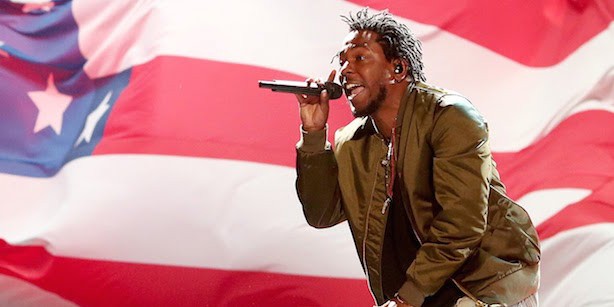 Music
Music
7 powerfully political songs from 2015
by Sean Johnston
December 17, 2015
Kendrick Lamar, Jenny Hval, and Protomartyr highlight a year of political awareness.
For as long as anyone has been paying attention, “preachy” has been a label worn like a scarlet letter in music, a more damning tag than even “pretentious” or perhaps “kind of like Mumford & Sons.”
When not favouring the often intentionally voiceless, and, therefore, generally apolitical aesthetics of ‘pure sound,’ the usually comfortable, largely white middle-class that constituted much of the presumed audience for ‘serious music’ critically and financially rewarded ‘personal music’, with safe, universal themes that never fall from fashion: love, sexuality, heartbreak, introspection, the desire to break stuff. Maybe I’m wrong about that last one.
Consequently, artists were careful to keep to topics that seldom dared to question the listener’s perceptions of the world. ‘Political music’ usually evoked frightful recollections of patronizing underground rappers, overly earnest folkies, or puritanical punks. Sophisticated artists were careful to distance themselves from any accusation of didacticism, as to escape the knowing glances, the exasperated roll of the eyes, the threat of being considered a killjoy, the assumption that they were here to tell you how to feel or act.
Yet, with the consequences of the 2008 financial collapse still being felt across an increasingly precarious millennial generation – coupled with the rise of (and ugly backlash against) online feminism and the widespread availability of cameras on phones finally able to capture the awful things cops have always done to racial minorities – audiences might be increasingly open to hearing more political and sociological themes than in the recent past. Or, at the very least, notable artists are increasingly less embarrassed to touch upon political themes or broach social issues.
The evidence of this is found all throughout contemporary music, though the broad rise is seldom remarked. The following are some notable examples from this year to illustrate.
Jenny Hval – “That Battle is Over”
With the fall of the Berlin Wall, conservative philosopher Francis Fukuyama famously declared in 1991 ‘the end of history.’ Events would still happen, Fukuyama claimed, but well within the unquestioned presumption that our current state of plutocratic liberal democratic capitalism would reign in perpetuity, any deviations from the status quo safely presumed redundant or ruinous. Many scoffed at Fukuyama’s declaration, but in societies where the gospel of personal responsibility means few look to structural causes to explain their predicament, and seldom turn to politics for solutions, it would seem a great many people accept Fukuyama’s thesis without ever having heard of him.
Jenny Hval’s sublime “That Battle is Over” posits a life lived on the “edge of history,” where the current order of things has proven resoundingly victorious over all takers, and hope in projects for human emancipation has been traded for individualist isolation and the limited thrills of cheap consumer goods. Beyond subtle improvements of our electronics, what we have now is what will ever be. Left to collapse into ourselves, an anxiety emanates from conditions and values to which we are subject but never gave consent. So we are left to wonder: am I inadequate or am I simply made to feel inadequate? Is it our ‘lifestyle choices’ or our own fallen genes that will give us breast cancer? “Are we loving ourselves now?” Sings Hval: “This is what happens at the edge of history.”
Holly Herndon – “Lonely At The Top”
We are, indeed, loving ourselves now, suggests Holly Herndon’s “Lonely At the Top”, as the unavoidable inequality and compulsory hedonism of late capitalism inescapably leads people into the cult of self-exaltation.
Breaking momentarily from the novel electro-acoustic pop of Herndon’s album Platform, “Lonely At the Top” recognizes the peculiar, impersonal flattery regularly found in YouTube ASMR videos and applies it to a tardy VIP’s massage appointment. Is our impressive VIP a hedge fund manager? An esteemed writer? A highly cited academic? A critically-acclaimed musician populating some of the same spaces as Herndon? A Michelin-starred chef? A delusional mediocrity who has been granted permission by the culture to walk around more puffed up than an inner tube being jockeyed down an icy hill by Martin Shkreli, Donald Trump and Vince McMahon? The diversity of possible application is what elevates “Lonely At the Top” from a personal condemnation to an amusing and unsettling commentary on the elevated sense of self that is the consequence of life in a deeply, if not increasingly, hierarchical society.
Protomartyr – “Dope Cloud”
“I’ll be the first to never die,” declares singer Joe Casey on Detroit post-punk act Protomartyr’s third album The Agent Intellect, poking fun at the inculcated values of a society that cherishes hedonic comfort above all else, resulting in fitness freaks and obsessive food watchers convinced they have the ability to perpetually outwit death so long as they continue to play their odds correctly.
Much of the enjoyment of listening to The Agent Intellect is in hearing Casey express the exhaustion that comes coupled with knowing that so much of ‘getting ahead’ is a vain attempt to keep our fostered status anxieties and Freudian nightmares at bay. “The halls of gold are theirs/You’re only renting space,” Casey sings on the stellar “Dope Cloud” to a striver who identifies with their masters but has yet to grasp that “that’s not gonna save you, man.”
Blood Orange – “Sandra’s Smile”
One moment you are elated that you finally landed the job you had been dearly hoping to get, a few hours later you’re dead in a jail cell under circumstances nobody cares to explain. The threat of this scenario actually happening is a reality people of colour in America and elsewhere live with daily – it is, after all, what happened to Sandra Bland, like many before and after her.
Not the type to keep his outrage to himself, Blood Orange’s Devonte Hynes turns his ire towards other manifestations of the same white supremacy in his adopted America that has led to the ongoing oppression of people of colour and perpetuated an apathetic or hostile white response.
“Look, an hour ago, I read [Trayvon Martin’s mother] Sybrina’s quote/Why should she forgive?/D’we lose you if, we don’t?” Hynes sings to white people who are outraged by the slaughter of children only insofar as they can be assured that a grieving mother absolves the same institutions that killed her son and let his killer walk free.
Jam City – “Unhappy”
Coming off the audacious and forward thinking aesthetics of his 2012 album Classical Curves, UK producer Jam City evidently found himself constricted by the post-dubstep landscape he appreciably altered and, quite literally, found his voice on his strikingly different, politically charged second album, Dream a Garden.
Though unfairly accused of easy sloganeering by critics accustomed to only accepting political themes in artful poetic code, the underrated Dream a Garden’s novel approach is to purposely openly state political observations, and then obfuscate through production choices, burying his voice deep in the mix. You have to be paying attention to even notice the content of the lyrics, but, like a life lived at the edge of history, self-apparent truths become evident once you’ve made the effort to tune in.
Le1f – “Taxi”
Speaking to Pitchfork in October, New York rapper Le1f questioned why some topics (“cars, drugs, women, and money”) are perpetually safe territory but others (“misogyny, homosexuality, transphobia, Black Lives Matter”) are often considered unfit for music. Le1f is asking: who are the people who believe these topics should be avoided? Who benefits from such an embargo?
“Boys pass me like taxis do/I don’t care, whatever, it’s cool,” Le1f raps on the hook for “Taxi,” one of the best songs of the year, cleverly mirroring the experiences of romantic rejection with being excluded and relegated for your identity. Yet, Le1f, while unashamed to acknowledge his reality, casually demonstrates that the question of being defeated by it was never posed. Music as defiant as it is hip shaking.
Kendrick Lamar – “Alright”
Though now so tied to Kendrick Lamar’s very identity as a rapper, what is maybe easy to forget about To Pimp a Butterfly is how, in the wake of the success of good kid m.A.A.d city, Lamar could have readily stuck to only safe and popular themes evinced on guest spots for hits “Fuckin’ Problems” and “Collard Greens,” probably without disappointing anyone.
Lamar, however, had other plans. As timely and prescient as it is musical and lyrical, To Pimp a Butterfly heralded the needed arrival of a rap god who was unembarrassed to speak directly about the imposed plight felt by many people of colour living in America to a popular audience. His “Alright” performance at the BET Awards provided an opportunity for known herbs to express, to a reactionary geriatric white audience, their incredulity that anyone could ever take issue with an institution that has systematically oppressed people of colour for the entirety of its existence.
What was lost, of course, in this impossibly dumb and probably racist rhetoric, was that “Alright,” like much of To Pimp a Butterfly, is strongly humanistic and life affirming in the face of perpetually trying circumstances and institutional oppression. I’m going to go out on a limb and suggest that the people unable to grasp this might so happen to be part of the problem.
Tags: Music, Lists, 2015 in review





